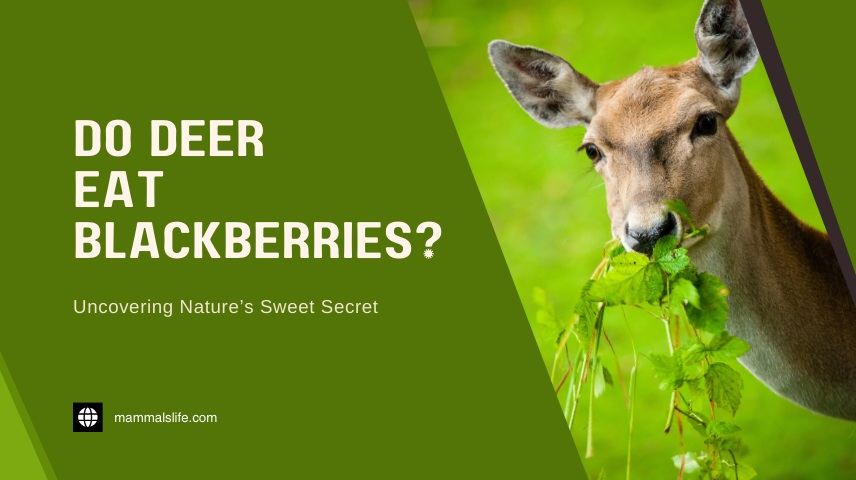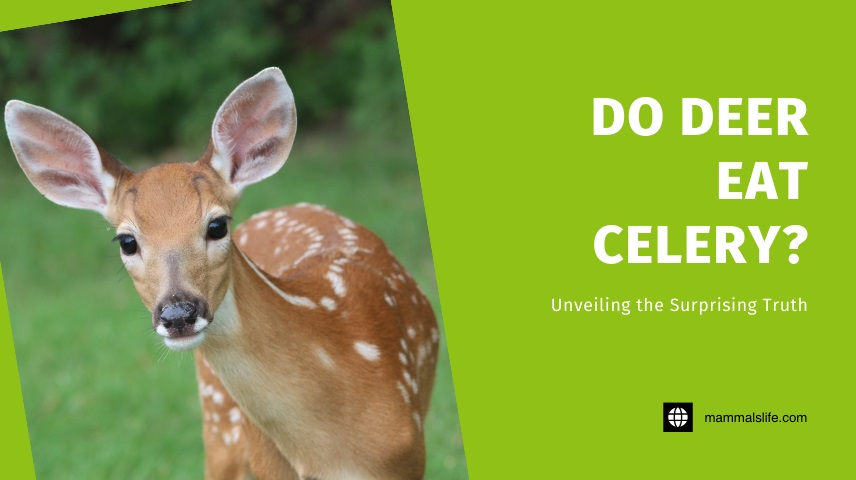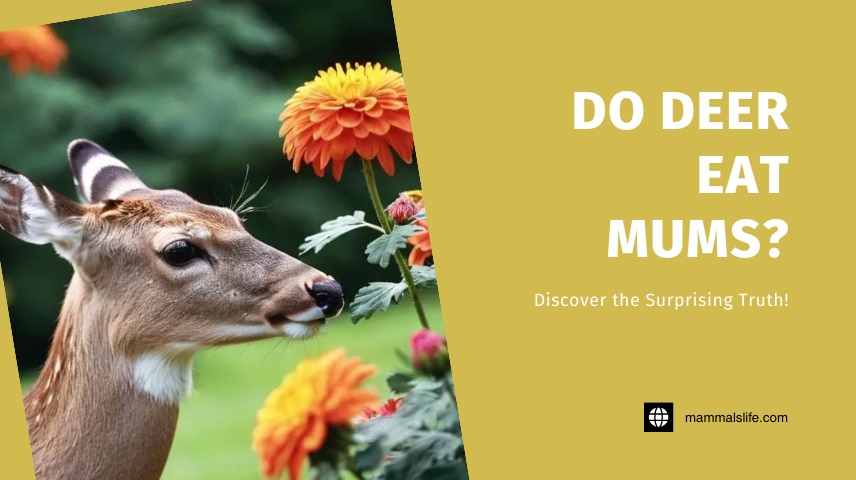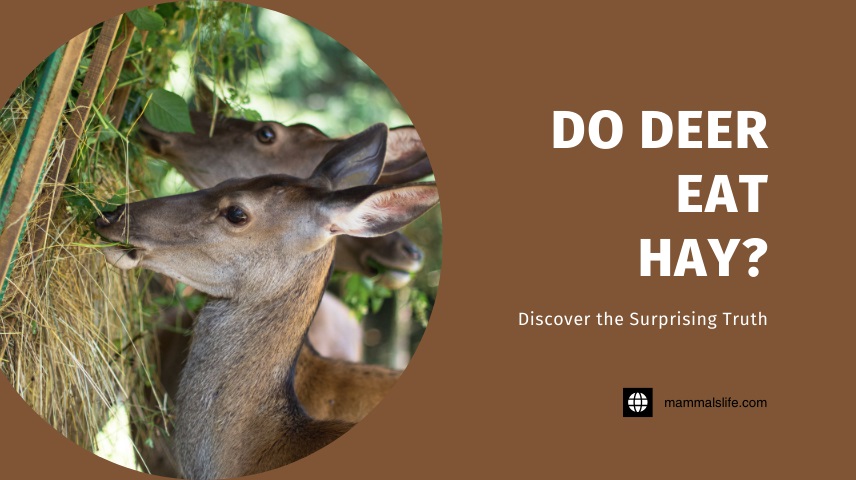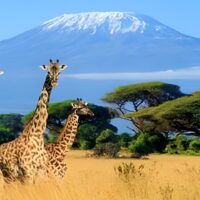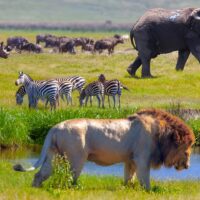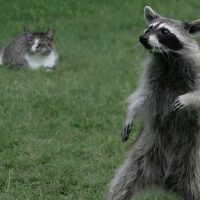Last Updated on February 22, 2025 by Mammals Life
Yes, deer eat blackberries. They enjoy both the berries and the plant itself.
Deer are known for their diverse diet, which includes a variety of fruits, plants, and shrubs. Blackberries are a favorite among them, providing essential nutrients and hydration. These fruits are accessible in many regions where deer inhabit, making them a common part of their diet.
Deer often consumes the berries directly from the bush, benefiting from the vitamins and sugars. They also eat the blackberry plant’s leaves and stems, which offer additional nutrition. Gardeners and farmers should be aware of this, as deer can quickly deplete blackberry bushes. Understanding deer feeding habits can help in managing and protecting crops effectively.
Diet Of Deer
Deer have a varied diet. They are herbivores, which means they eat plants. Their food choices depend on the season and their habitat. Understanding what deer eat helps us know more about their behavior and needs.
Common Food Sources
Deer enjoy a range of plants. They eat leaves, twigs, and fruits. Some common food sources include:
- Grasses
- Shrubs
- Tree leaves
- Fruits
- Nuts
They also munch on flowers and fungi. Blackberries are among their favorite fruits. Deer often search for blackberries during certain seasons.
Seasonal Variations
The diet of deer changes with the seasons. In spring, they eat fresh leaves and young plants. During summer, they consume more fruits and berries.
| Season | Food |
|---|---|
| Spring | Fresh leaves, young plants |
| Summer | Fruits, berries, including blackberries |
| Fall | Nuts, acorns, fallen fruits |
| Winter | Bark, twigs, evergreen leaves |
In the fall, deer eat nuts and fallen fruits. Winter makes food scarce. They then rely on bark and twigs. Blackberries are usually available in summer. This makes them a seasonal treat for deer.
Read More – Do Deer Eat Potato Plants and What Can You Do?
Nutritional Value Of Blackberries
Deer often find blackberries tasty, but what makes them so nutritious? Blackberries are packed with essential nutrients, making them a healthy choice for many animals, including deer. Let’s explore the key nutrients found in these delicious berries.
Vitamins And Minerals
Blackberries are rich in vitamins and minerals. They provide a variety of essential nutrients that contribute to overall health.
| Nutrient | Amount per 100g |
|---|---|
| Vitamin C | 21 mg |
| Vitamin K | 19.8 µg |
| Folate | 25 µg |
| Calcium | 29 mg |
| Iron | 0.62 mg |
Vitamin C helps boost the immune system. Vitamin K plays a role in blood clotting. Folate supports cell division and growth. Calcium is vital for strong bones and teeth. Iron is essential for transporting oxygen in the blood.
Health Benefits
Blackberries offer several health benefits. They are low in calories and high in fiber, making them an excellent choice for a healthy diet.
- Antioxidants: Blackberries are rich in antioxidants that protect cells from damage.
- Anti-inflammatory: These berries have anti-inflammatory properties that help reduce swelling.
- Heart Health: The fiber and antioxidants in blackberries support heart health.
- Digestive Health: High fiber content aids in digestion and prevents constipation.
- Skin Health: Vitamins and antioxidants help maintain healthy skin.
Including blackberries in the diet can lead to numerous health benefits. Deer enjoy these berries for their taste and nutritional value.
Read More – Do Deer Eat Sweet Potatoes? Insights from Wildlife Experts
Deer And Blackberry Consumption
Blackberries are a delightful treat for many animals. Deer are no exception. Understanding their eating habits can help gardeners protect their crops. Deer loves to munch on blackberries. This can impact the growth of these bushes.
Frequency And Preferences
Deer frequently visit blackberry bushes. They often prefer them over other plants. The sweet taste of blackberries draws them in. They eat the berries and leaves.
Different factors affect how often deer eat blackberries. The availability of other food sources is one. The population of deer in the area also matters. During certain seasons, deer might eat more blackberries.
| Season | Deer Activity |
|---|---|
| Spring | Moderate |
| Summer | High |
| Fall | Moderate |
| Winter | Low |
Impact On Blackberry Bushes
Deer eating blackberries can damage bushes. They eat the berries, reducing the harvest. They also nibble on the leaves and stems. This can stunt the growth of the bush.
Over time, repeated feeding can kill the plant. Young bushes are especially vulnerable. Older bushes might survive but will still suffer.
Gardeners must protect their blackberry bushes from deer. Fences can be effective. Deer repellents can also help. Keeping deer away ensures a healthy crop.
Read More – Do Deer Eat Potatoes? Understanding the Dietary Habits of Deer
Ecological Role Of Deer
Deer play a crucial role in maintaining the balance of ecosystems. They influence various aspects of the environment, from plant growth to seed dispersal. Understanding their ecological role can give insights into their interactions with other species.
Seed Dispersal
Deer are essential for seed dispersal in forests and grasslands. They consume various fruits, including blackberries. The seeds pass through their digestive system unharmed. When deer excrete, they deposit seeds in new locations. This helps plants spread and grow in different areas.
| Fruit | Seed Dispersal |
|---|---|
| Blackberries | Effective |
| Blueberries | Moderate |
| Acorns | Limited |
Influence On Plant Growth
Deer affects plant growth in multiple ways. They prune plants by eating leaves and stems. This can stimulate new growth. However, overgrazing can harm plants and reduce biodiversity. The balance is crucial for maintaining healthy ecosystems.
- Pruning stimulates new growth.
- Overgrazing harms plant health.
- Balanced grazing maintains biodiversity.
Protecting Your Garden
Deer loves eating blackberries. If you have a garden, you might notice them munching on your plants. Protecting your garden from these hungry visitors is important. Let’s explore some effective ways to keep your garden safe.
Deterrent Methods
There are many ways to deter deer from your garden. Some methods work better than others. Here are a few options:
- Fencing: A tall fence can keep deer out. Make sure it is at least 8 feet high.
- Motion-activated sprinklers: These devices spray water when deer approach, scaring them away.
- Deer repellents: Use sprays made from strong smells like garlic or rotten eggs. These can make your plants less tasty to deer.
- Noisemakers: Wind chimes or radios can scare deer away with sudden sounds.
- Lighting: Bright lights can startle deer and keep them out of your garden.
Alternative Food Sources
If you provide deer with alternative food sources, they may leave your garden alone. Here are some ideas:
- Deer feeders: Place feeders with corn or other grains away from your garden.
- Planting alternative plants: Grow plants that deer prefer over your garden plants. Clover and alfalfa are good choices.
- Salt licks: Deer loves salt. Placing a salt lick far from your garden can attract them away.
By following these tips, you can protect your garden and enjoy a bountiful harvest. Happy gardening!
Frequently Asked Questions
Do Deer Eat Blackberries?
Yes, deer eat blackberries. They enjoy both the fruit and leaves.
Are Blackberries Safe For Deer?
Blackberries are safe for deer. They provide essential nutrients and hydration.
Do Deer Prefer Blackberry Leaves Or Fruit?
Deer prefers blackberry fruit but will eat leaves when fruit is scarce.
Can Blackberries Attract Deer To My Garden?
Yes, blackberries can attract deer. They are drawn to the sweet berries and foliage.
How To Protect Blackberries From Deer?
Use fencing or deer repellents to protect blackberry plants from being eaten.
Conclusion
Deer do enjoy eating blackberries, making them a common snack in their diet. Gardeners should consider protective measures. Fencing and repellents can help safeguard your blackberry bushes. Understanding deer behavior aids in better garden management. Enjoy your garden while keeping it deer-friendly yet protected.

